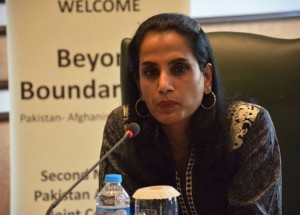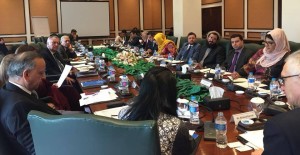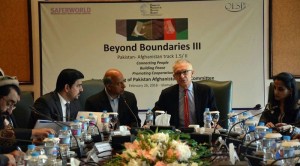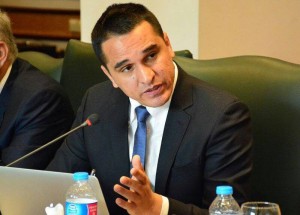During the second visit/meeting of the Beyond Boundaries’ Pakistan Afghanistan Joint Committee (PAJC), as part of the strategic sideline meetings with government and non-government stakeholders, the PAJC members from Afghanistan and Pakistan met with the UNHCR Representative, Ms. Ruven Menikdiwela on the status of Afghan refugees in Pakistan, at Serena Hotel, on 26 February, 2018.
Ms. Menikdiwela made a detailed presentation of the UNHCR policy and the trilateral current situation. She briefed the PAJC groups that Pakistan currently has 1.4 million registered Afghan refugees. However, additionally, apart from these registered Afghan refugees, a second component of the overall presence of Afghan nationals in Pakistan also includes some 860,000 Afghan citizens who have been registered under a separate Afghan citizenship program. The registration of these Afghans commenced in August 2017 jointly by the Governments of Afghanistan and Pakistan and is set to be concluded at the end of February 2018. These people at this point are being issued cards to their status as Afghan citizens which will eventually enable them to return to Afghanistan in order to obtain their Afghan passport, valid Pakistani visas, and then being able to come back here as legal migrants or residents or workers. A third group of Afghans who are not registered as refugees or Afghan citizens reside in Pakistan illegally and work principally in urban areas, such as Karachi and Lahore. According to Pakistan Government’s estimates, they are about 300,000 – 400,000. These are people that fall in neither of the first two categories. They are neither documented, nor known to the local law enforcement agencies. Their presence here is not legal.
She told the groups that UNHCR mandate only applies to the first group; the 1.4 million registered refugees. She said that while the Afghan embassy looks at it more holistically in terms of the entire Afghan population here, UNHCR perspective is a lot more limited. There is confusion in the public perception that when they hear of Afghans, the Pakistani public tends to refer to all of them as refugees but they are not. A lot of them are here as migrant workers and not here as refugees which means that they did not leave Afghanistan for reason of conflict but rather because they wanted to find livelihood opportunities in Pakistan. UNHCR mandate does not cover these people.
She further elaborated that despite some of the rhetoric seen in the media, UNHCR’s relations with the Government of Pakistan have been extremely positive. While the Cabinet in the first week of January 2018 did stipulate that all Afghans had to return to Afghanistan and, in fact, when it came to the registered refugees, they extended their stay only till the 31st of January and tasked the Ministry of States and Frontiers Regions to come up with a plan until 31st January 2018 for the repatriation of Afghan refugees. This plan was subsequently reviewed last week in February which the UNHCR also appreciates. The plan provides the registered refugees with three options: 1) Encouraging voluntary return to Afghanistan; 2) those refugees who wish to remain in Pakistan should obtain an Afghan passport from the Afghan Embassy and Consulates in Pakistan as well as obtain a Pakistani visa so they would not be required to return to Afghanistan. Then they can reside here legally as either unskilled laborers, as white collar workers, as students or on health visas. 3) The main income earner in the family can be permitted to remain in Pakistan on a work visa while the rest of the family would be encouraged to return to Afghanistan and subsist on the remittances provided by their main bread winner.
For the second category of Afghans that include the 860,000 Afghan citizen cardholders who have been registered will be required to return to Afghanistan during the validity of their cards and furnish themselves with Afghan passports and valid Pakistani visas and then return to Pakistan. For the third group of Afghans that resides in Pakistan illegally and who do not fall in either of the two previous groups would, if apprehended, be deported immediately. This, UNHCR believes, is the sovereign right of every government to deal with any illegal migration within their borders. Ms. Menikdiwela, stated that the Cabinet had seemingly endorsed the broad outlines of this plan given by SAFRON in their weekly meeting last Tuesday (February 20, 2018). As part of this plan, the refugee cards will be extended till the 30th of June, 2018. However, UNHCR believes this timeframe is not sufficient for 1.4 million people to make up their minds and leave for Afghanistan. UNHCR believes that the reason for this deadline is that Pakistan will have general elections in May and the current government does not want to leave Pakistan’s refugee policy to the next government.
UNHCR representative stated that she has been in discussions with Pakistani Government on the issue of linking Afghan refugees to incidents of terrorism in Pakistan and from our discussions we have found that there is no concrete evidence that the refugee villages have ever provided safe havens to terrorists. However, that being said, UNHCR is a non-political organization and cannot vouch for the integrity of every single individual in the 1.4 million registered Afghan refugees under its mandate. If the Government of Pakistan does have concrete evidence against any individuals in the registered Afghan refugees that they indeed are complicit in acts of terror, then by all means Pakistan should, according to its law, deal with these people as they should be dealt with. This is because terrorists cannot seek refuge in refugee villages. UNHCR is clear in its position that it would never provide cover to terrorists masquerading as refugees. Refugees by legal conventions’ definition are civilians caught up in a humanitarian situation. The vast majority of Afghan refugees are living in Pakistan peacefully and contributing to its economy and have fled for reasons of conflict and persecution and are deserving of international protection, which the government of Pakistan has very generously provided to them for the last 40 years.
She further stated that UNHCR understands that 40 years is a long time and Afghan refugees residing in Pakistan is one of the world’s most protracted refugee situations. UNHCR’s position is also that the preferred long-term solution for the Afghan refugee problem is their voluntary repatriation to Afghanistan. But this return does have to be voluntary, gradual and in conditions of safety and dignity while also being sustainable. UNHCR also recognizes that the conditions at this point in Afghanistan are not conducive to a mass scale return of 1.4 million and the economy of Afghanistan cannot absorb that. This is also a sentiment that has been expressed at the highest levels of the Government in Afghanistan.
M. Faridon Sikendar, Advisor to Afghanistan CEO on refugees, speaking from Afghan side said that Afghan refugees are not only coming back from Pakistan but also from Iran. The UNHCR is providing the registration process for all these refugees. He told the UNHCR Representatives that besides the Ministry of Refugees and Repatriation, Afghanistan has recently formed the High Council for Refugees at national level. While after extensive cabinet meetings towards the end of January, 2018, refugee divisions have been formed at the Afghan President and CEO offices to address the issue of refugees returning to Afghanistan and their settlement and sustainability including livelihood and other facilies. He said we are in the process of chalking out plans for lands, housing, education, health and other basic facilities for the refugees who are returning from both countries. He told the participants: “we have economic constraints to take complete care of the returning refugees; we seek help from UNHCR, international community, and government of Pakistan to work with us”.




